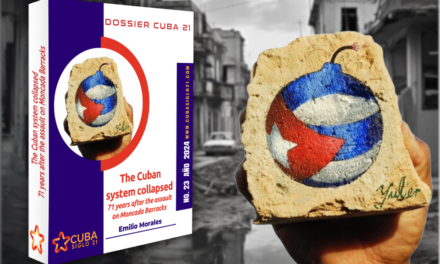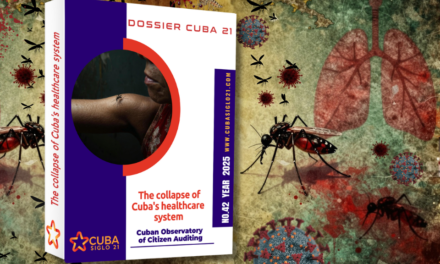Descargar informe completo
Download report in English
Summary
GAESA—the real power in Cuba—has driven the country into the worst financial crisis in its history. Behind the façade of socialism, a military oligarchy controls more than 70% of the economy and 95% of the nation’s financial system, while the civilian government operates as little more than a puppet. In practice, the administration headed by Miguel Díaz-Canel has no control over the country’s finances. The Central Bank of Cuba, the institution that should oversee national financial management, is fully subordinated to and dominated by GAESA’s interests.
This study, presented at the ASCE 2025 conference “Recovering Cuba,” reveals how the concentration of economic power in GAESA has triggered productive collapse, the plundering of the healthcare system, and the accelerated impoverishment of millions of Cubans.
Conclusiones
The Cuban economy is stuck in what may be the worst financial crisis of its history. The responsible factors for this dire situation are not external issues, such as the embargo and U.S. sanctions, but internal policies pursued by the ruling government, and their mismanagement of the economy and its finances. As has been shown in this document, the main parties responsible for the inflationary crisis are GAESA and President Miguel Díaz-Canel.
The impunity that GAESA has enjoyed regarding its management of the country’s finances and its ability to make decisions regarding national priorities, evading common accountability norms of government audit agencies, is one of the key factors behind the reigning inflation. The passivity of President Miguel Díaz-Canel, and his acceptance of GAESA’s priorities, has taken the country’s economy down a path of financial anarchy that seems to be irreversible in the short term.
The shortage of hard currency is a fact. The recent 70% fall in remittances and 50% drop in tourist arrivals are two of the factors that have triggered the shortage of hard currency and driven up inflation. The low productivity in the production of food and manufactured goods has also contributed to inflation. To make matters worse, the increase in the national foreign debt, the drying up of lines of credit because of lack of repayment, the contraction of foreign investment, and the reaction by foreign companies operating in the island to the restrictions imposed by the government has turned the Cuban market into a veritable cemetery for foreign commercial partners. Cuba is today one of the highest risk countries for foreign companies to do business or invest.
Also contributing to the island’s financial crisis is the fraud perpetrated on the public health system by GAESA, through a scheme with elements of modern slavery that confiscates a significant share of the pay received by Cuban medical and paramedical personnel providing services abroad. Cuba sells this system to the world as humanitarian missions to help poor countries address their public health deficiencies, with the revenue raised to be destined to maintain and improve the Cuban national Public Health System. In reality, exports of medical services have turned out to be a very lucrative business for the island, generating an estimated 108,530 million dollars in the last 15 years, of which Cuba has invested only 1,741 million dollars (or 1.61 % of revenue) in the national Public Health System.
The Cuban government confiscates a high share of the income generated by the export of medical services, with this share being at least 70% and in some instances about 90%. Under this scheme, GAESA has pocketed about 70,000 million dollars in the last 15 years, an amount that could have been invested in modernizing the island’s electricity generation system, upgrading hospitals and pharmacies and purchasing medicines and other medical service inputs, and modernizing the production of medications. Should Cuba had made these investments, Cuban citizens would not face the tremendous shortages of medications that affect pharmacies and hospitals.
Creating and abetting the current inflationary environment, as those who govern Cuba have done, done, misusing the resources of the nation often for their own benefit, and evading accountability mechanisms regarding the national finances represent a deplorable act of corruption.
The inflationary crisis has wiped out the purchasing power of the salaries earned by workers and of pensions received by the elderly population. Currently the monthly salary of an average Cuban worker is barely sufficient to meet one week’s basic expenses. Government action and inaction has forced 10 million Cubans into poverty, many of them having to subsist on one meal a day and lacking essential services such as transportation, running water, electricity, food and medicines. Taking away these essential services from the population is a genocidal act. Cuba’s future portends a humanitarian crisis without precedent in its history.
The way forward to abort the financial crisis that has practically paralyzed the country and impoverished the population is to eliminate the system of governance that rules the nation. Cuba requires not only a structural reform of its economy, but also political change that would replace the actual governance system, reestablish democracy, guarantee the separation of powers, and return political and economic freedom to its citizens.







